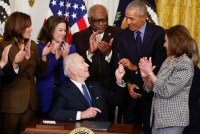Latest KFF Health News Stories
Trump Team Faces Key Legal Decision That Could Put Mental Health Parity in Peril
The administration is facing a May 12 deadline to declare if it will defend Biden-era regulations that aim to enforce laws requiring parity in insurance coverage of mental and physical health care.
‘They Won’t Help Me’: Sickest Patients Face Insurance Denials Despite Policy Fixes
The fatal shooting of UnitedHealthcare CEO Brian Thompson prompted both grief and public outrage about the ways insurers deny treatment. Republicans and Democrats agree prior authorization needs fixing, but patients are growing impatient.
Thought Inflation Was Bad? Health Insurance Premiums Are Rising Even Faster
California businesses saw employees’ monthly family insurance premiums rise nearly $1,000 over a 15-year period, more than double the pace of inflation. And employees’ share grew as companies shifted more of the cost to workers.
Rage Has Long Shadowed American Health Care. It’s Rarely Produced Big Change.
The outpouring of anger at health insurers following the killing of UnitedHealthcare CEO Brian Thompson continues a cycle of rage that dates back decades.
Trump’s White House Return Poised To Tangle Health Care Safety Net
The new Trump administration is likely to reduce subsidies for Affordable Care Act insurance plans and roll back Medicaid coverage. Public health authorities worry that anti-vaccine activist Robert F. Kennedy Jr. will be empowered.
Election Outcome Could Bring Big Changes to Medicare
Democrats and conservatives are divided over whether the federal health program for people over 65 should be run almost entirely by the private sector. If Trump retakes the White House, the shift to Medicare Advantage may accelerate.
What’s at Stake: A Pivotal Election for Six Big Health Issues
Health care has ebbed and surged as an election issue throughout the presidential campaign. Here are the ways some of the most consequential changes in health policies could hinge on whether Vice President Kamala Harris or former President Donald Trump wins.
What the Health? From KFF Health News: LIVE From KFF: Health Care and the 2024 Election
The Affordable Care Act has not been a major issue in the 2024 campaign, but abortion and reproductive rights have been front and center. Those are just two of the dozens of health issues that could be profoundly affected by who is elected president and which party controls Congress in 2025. In this special live episode, Tamara Keith of NPR, Alice Miranda Ollstein of Politico, and Cynthia Cox and Ashley Kirzinger of KFF join KFF Health News chief Washington correspondent Julie Rovner to discuss how health policy has affected the campaign and how the election results might affect health policy. Plus, the panel answers questions from the live audience.
What the Health? From KFF Health News: Yet Another Promise for Long-Term Care Coverage
As part of her presidential campaign, Vice President Kamala Harris has rolled out a plan for Medicare to provide in-home long-term care services. The proposal would fill a longtime need for families trying to simultaneously care for young children and older parents, but its enormous price tag makes it a promise unlikely to be fulfilled. Meanwhile, a growing number of Republican candidates up and down the ballot facing voter backlash over their support for abortion restrictions are trying to reinvent their positions. Shefali Luthra of The 19th, Jessie Hellmann of CQ Roll Call, and Joanne Kenen of Johns Hopkins University and Politico join KFF Health News’ Julie Rovner to discuss these stories and more. Also this week, excerpts from a KFF lunch with “Shark Tank” panelist and generic drug discounter Mark Cuban, who has been consulting with the Harris campaign about health care issues.
What’s New and What To Watch For in the Upcoming ACA Open Enrollment Period
This year’s start date in most states is Nov. 1, and consumers may encounter new scams as well as important rule changes.
Some Employers Test Arrangement To Give Workers Allowance for Coverage
Employers are showing interest in a type of health reimbursement account that gives workers a contribution to choose and buy their own plans, rather than participating in group plans.
How Two States Reveal a Deeper Divide on Insuring Kids’ Health
Arizona and Florida lawmakers saw trouble ahead for children in 2023, with states slated — as the covid-19 pandemic waned — to resume disenrolling ineligible people from Medicaid. So, legislators in both states voted to expand a safety net known as the Children’s Health Insurance Program, or CHIP, which covers those 18 and younger in […]
A Tale of Two States: Arizona and Florida Diverge on How To Expand Kids’ Health Insurance
Both Florida and Arizona want to expand eligibility for the Children’s Health Insurance Program, known as CHIP, but their approaches to charging low-income families premiums for the coverage showcase the nation’s ideological divide on helping the disadvantaged.
What the Health? From KFF Health News: For ACA Plans, It’s Time to Shop Around
It’s Obamacare open enrollment season, which means that, for people who rely on these plans for coverage, it’s time to shop around. With enhanced premium subsidies and cost-sharing assistance, consumers may find savings by switching plans. It is especially important for people who lost their coverage because of the Medicaid unwinding to investigate their options. Many qualify for assistance. Meanwhile, the countdown to Election Day is on, and Ohio’s State Issue 1 is grabbing headlines. The closely watched ballot initiative has become a testing ground for abortion-related messaging, which has been rife with misinformation. This week’s panelists are Mary Agnes Carey of KFF Health News, Jessie Hellmann of CQ Roll Call, Joanne Kenen of the Johns Hopkins Bloomberg School of Public Health and Politico, and Rachana Pradhan of KFF Health News.
Comienza la inscripción para los seguros de salud del Obamacare
Los consumidores pueden ir en línea, llamar o buscar ayuda de un corredor, o un navegador, para conocer sus opciones de cobertura para 2024, calcular sus posibles subsidios o cambiar de plan.
Start Shopping: Enrollment Begins Nov. 1 for Most Obamacare Insurance Plans
More than 16 million Americans who buy their own health insurance through state and federal marketplaces have until Jan. 15 to compare prices, change their coverage, or enroll for the first time.
What the Health? From KFF Health News: A Health-Heavy State of the Union
President Joe Biden’s 2023 State of the Union address leaned heavily on health care issues. Biden took a victory lap for recent accomplishments like capping prescription drug costs for seniors on Medicare. He also urged Congress to make permanent the boosted premium subsidies under the Affordable Care Act, and he sparred with Republicans on threats to cut Social Security and Medicare. Also this week, both sides in the abortion debate are bracing for a court decision out of Texas that could, at least temporarily, make the abortion pill mifepristone illegal nationwide. Alice Miranda Ollstein of Politico, Rachel Cohrs of Stat, and Sarah Karlin-Smith of the Pink Sheet join KHN chief Washington correspondent Julie Rovner to discuss these issues and more. Also this week, Rovner interviews Kate Baicker of the University of Chicago about a possible middle ground in the effort to get universal health insurance coverage.
Numbers Don’t Lie. Biden Kept His Promise on Improving Obamacare.
KHN has teamed up with our partners at PolitiFact to monitor 100 key promises made by Joe Biden during the 2020 presidential campaign — including those surrounding the Affordable Care Act.
Colorado Option’s Big Test: Open Enrollment
Critics were ready to bury the state’s new health insurance plans, based on a public option, when 2023 rate hikes were announced, but officials are confident people will be drawn to the plans’ benefits.
Empleadores se preocupan por la salud mental, pero no hay suficientes proveedores
Casi la mitad de los grandes empleadores encuestados, con al menos 200 trabajadores, informaron que una proporción cada vez mayor de sus empleados utilizaba servicios de salud mental.























